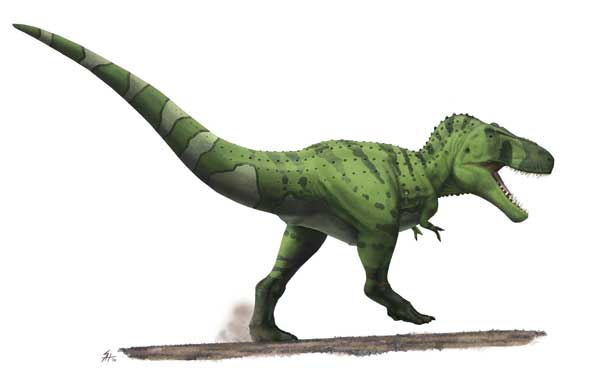T. Rex Declared Faster After Inspection of Its Rump

Get the world’s most fascinating discoveries delivered straight to your inbox.
You are now subscribed
Your newsletter sign-up was successful
Want to add more newsletters?

Delivered Daily
Daily Newsletter
Sign up for the latest discoveries, groundbreaking research and fascinating breakthroughs that impact you and the wider world direct to your inbox.

Once a week
Life's Little Mysteries
Feed your curiosity with an exclusive mystery every week, solved with science and delivered direct to your inbox before it's seen anywhere else.

Once a week
How It Works
Sign up to our free science & technology newsletter for your weekly fix of fascinating articles, quick quizzes, amazing images, and more

Delivered daily
Space.com Newsletter
Breaking space news, the latest updates on rocket launches, skywatching events and more!

Once a month
Watch This Space
Sign up to our monthly entertainment newsletter to keep up with all our coverage of the latest sci-fi and space movies, tv shows, games and books.

Once a week
Night Sky This Week
Discover this week's must-see night sky events, moon phases, and stunning astrophotos. Sign up for our skywatching newsletter and explore the universe with us!
Join the club
Get full access to premium articles, exclusive features and a growing list of member rewards.
As far as killing machines go, T. rex was arguably the paleo-titleholder. Now thanks to a closer look at the beast's rear end, scientists may have upped the ante. Apparently, the dinosaur sported some of the beefiest tail muscles, which powered a swift run.
Result: T. rex could have run down any other dinosaur in its environment, the research suggests. Until now, scientists thought Tyrannosaurus rex's tail served only to counterbalance the weight of the dinosaur's enormous head.
"Contrary to earlier theories, T. rex had more than just junk in its trunk," said study researcher Scott Persons, a University of Alberta graduate student.
Butt basics
To get a peg on how powerful T. rex's tail was, Persons compared it with the tails of modern-day reptiles, such as crocodiles, Komodo dragons, brown basilisk lizards, veiled chameleons and green iguanas. To do so, he dissected several of the modern reptiles to look for evidence in the bones for insertion points of muscles — basically, bone correlates he could use to reconstruct a reptile's musculature (for specimens for which only bones were available, such as T. rex). He found the single largest tail muscle in these reptiles was the M. caudofemoralis, which attaches to the femur.
"While most of the muscles in the tail are responsible for swishing, curling and stabilizing the tail — they're involved in tail movement — the primary function of M. caudofemoralis is in locomotion," Persons told LiveScience.
As that muscle contracts, it brings the femur back, putting it in a position to push off of and move forward.
Get the world’s most fascinating discoveries delivered straight to your inbox.
Based on this information and information gleaned from studying skeletal specimens at museums, Persons digitally reconstructed the tails of modern reptiles, as well as T. rex and two other theropods (a group of bipedal, carnivorous dinosaurs) – Gorgosaurus libratus and Ornithomimus edmontonicus.
He figured T. rex would have a bulky tail, comparable to that of crocodiles. "As it turns out, [its tail] was beefier than crocodiles," Persons said in a telephone interview.
Its M. caudofemoralis would have also dwarfed those of Gorgosaurus and Ornithomimus. Overall, the muscle mass in T. rex's tail has likely been underestimated by as much as 45 percent up until now.
Gotta run!
As for how T. rex's tail muscles got so giant, Persons said the development had to do with the tail's structure. The tails of both T. rex and modern reptiles are equipped with rib bones that are attached to vertebrae. Those ribs are located much higher on T. rex's tail, leaving much more room along the lower end of the tail for the caudofemoralis muscles to bulk up and expand. Without rib bones to limit the size of the tail-locomotive muscles, they turned into robust powerhouses enabling T.rex to run … fast.
"It looks like T. rex was suited to outrun all the other dinosaurs in its environment," Persons said, including duckbills, sauropods, horned dinosaurs and ankylosaurs.
The new, bulkier tail painted by this study also suggests T. rex was more stable overall, because the bigger tail muscles would've shifted the dinosaur's center of mass back slightly, Persons said. That means the dinosaur didn't have to use as much energy to support its heft, and instead could focus that energy on running.
"It's more mass in the back for sure. But it's more mass just like a jumbo jet engine is more mas"
The results not only reveal how T. rex hunted and may have interacted with other dinosaurs (since now it could easily snag them), it also suggests a rewrite of dinosaur illustrations. Over time, as paleontologists learned more about dinosaurs, their drawings also got updates, morphing the animals into athletic, agile beasts that were much slimmer than in the past. However, as their bodies slimmed down, so did their rear ends.
"This study tries to change the face of Tyrannosaur rear ends," Persons said. With the makeover, future illustrations should also enlarge T. rex’s derriere.
The research is detailed in the journal The Anatomical Record.
Jeanna Bryner is managing editor of Scientific American. Previously she was editor in chief of Live Science and, prior to that, an editor at Scholastic's Science World magazine. Bryner has an English degree from Salisbury University, a master's degree in biogeochemistry and environmental sciences from the University of Maryland and a graduate science journalism degree from New York University. She has worked as a biologist in Florida, where she monitored wetlands and did field surveys for endangered species, including the gorgeous Florida Scrub Jay. She also received an ocean sciences journalism fellowship from the Woods Hole Oceanographic Institution. She is a firm believer that science is for everyone and that just about everything can be viewed through the lens of science.
 Live Science Plus
Live Science Plus










